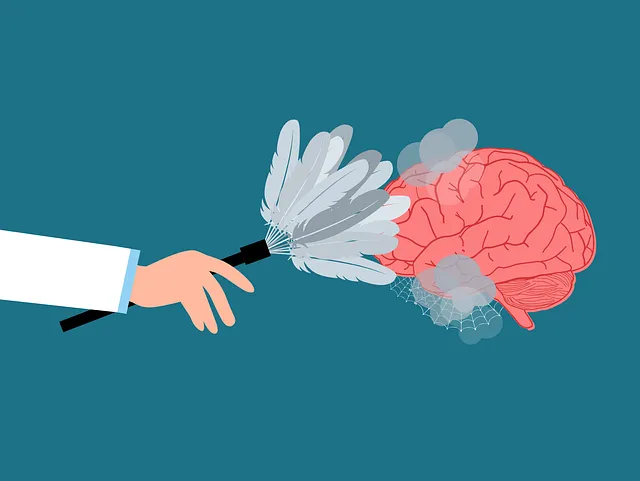Littleton Kaiser Permanente behavioral health services face significant challenges in accurately diagnosing mental illness due to complex patient presentations and diverse symptoms. To overcome these hurdles, they've adopted innovative strategies like Stress Management Workshops, Mental Wellness Coaching Programs, and Risk Management Planning for professionals. By combining coaching, public awareness campaigns, and advanced assessment tools, the services aim to enhance diagnosis accuracy, improve patient outcomes, reduce healthcare costs, and destigmatize mental health issues, ultimately revolutionizing behavioral health care.
Mental illness diagnosis accuracy is a critical aspect of patient care, especially at facilities like Littleton Kaiser Permanente Behavioral Health Services. This article delves into the challenges faced in accurately diagnosing mental illnesses and explores innovative strategies employed by Littleton Kaiser Permanente to enhance diagnostic accuracy. We examine techniques that promise significant improvements in behavioral health care delivery. Additionally, we discuss the impact of these efforts and future directions aimed at refining diagnosis accuracy in the field.
- Understanding the Challenges of Mental Illness Diagnosis Accuracy at Littleton Kaiser Permanente Behavioral Health Services
- Innovative Strategies and Techniques to Enhance Diagnostic Accuracy
- The Impact and Future Directions for Improving Diagnosis Accuracy in Behavioral Health
Understanding the Challenges of Mental Illness Diagnosis Accuracy at Littleton Kaiser Permanente Behavioral Health Services

At Littleton Kaiser Permanente Behavioral Health Services, accurate mental illness diagnosis is a complex challenge due to the multifaceted nature of human emotions and behaviors. The vast spectrum of mental health disorders, each with unique symptoms and manifestations, presents a significant hurdle for healthcare professionals. This complexity is further compounded by the individual differences in presentation among patients, making it difficult to differentiate subtle nuances that could point to different conditions.
Moreover, the dynamic interplay between biological, psychological, and social factors contributes to an intricate web of potential causes for mental illness. To address these challenges, Littleton Kaiser Permanente Behavioral Health Services has been proactive in implementing various strategies. These include the organization of Stress Management Workshops aimed at enhancing emotional well-being promotion techniques among patients and staff. Additionally, they have developed robust Risk Management Planning for Mental Health Professionals to mitigate risks associated with diagnosis and treatment.
Innovative Strategies and Techniques to Enhance Diagnostic Accuracy

At Littleton Kaiser Permanente behavioral health services, innovative strategies and techniques are being implemented to enhance mental illness diagnosis accuracy. One notable approach involves integrating Mental Wellness Coaching Programs that empower individuals with coping skills development, enabling them to actively participate in their treatment plans. These programs not only improve patient engagement but also provide valuable insights for healthcare professionals.
Additionally, Public Awareness Campaigns Development has played a pivotal role in destigmatizing mental health issues and educating the community. By fostering open conversations, these campaigns facilitate early recognition of symptoms, leading to timely interventions. This multifaceted approach, combining coaching programs and public awareness initiatives, is revolutionizing diagnostic accuracy, ultimately improving patient outcomes and overall mental wellness.
The Impact and Future Directions for Improving Diagnosis Accuracy in Behavioral Health

Improving diagnosis accuracy in behavioral health is paramount for providing effective treatment and enhancing patient outcomes, particularly at institutions like Littleton Kaiser Permanente behavioral health services. Misdiagnosis or delayed identification of mental illnesses can lead to exacerbation of symptoms, decreased quality of life, and increased healthcare costs. Therefore, focusing on the impact and future directions of improving diagnosis accuracy is crucial.
Future efforts should prioritize integrating advanced assessment tools and techniques, such as technology-aided diagnostic aids and evidence-based practice protocols. Promoting mental health awareness through educational initiatives and public outreach can foster a better understanding of various disorders. Additionally, implementing empathy building strategies within healthcare settings can facilitate stronger patient-provider relationships, encouraging open communication and accurate diagnoses.
In conclusion, improving mental illness diagnosis accuracy at Littleton Kaiser Permanente Behavioral Health Services is a multifaceted endeavor. By understanding the unique challenges inherent in this process and adopting innovative strategies, such as advanced assessment tools and multidisciplinary collaboration, we can significantly enhance diagnostic accuracy. The impact of these efforts extends beyond individual patient care, promising better outcomes and more effective treatment plans for those seeking behavioral health services. Future research should continue to explore these techniques and their long-term effects, ultimately contributing to a more robust and compassionate healthcare system.






